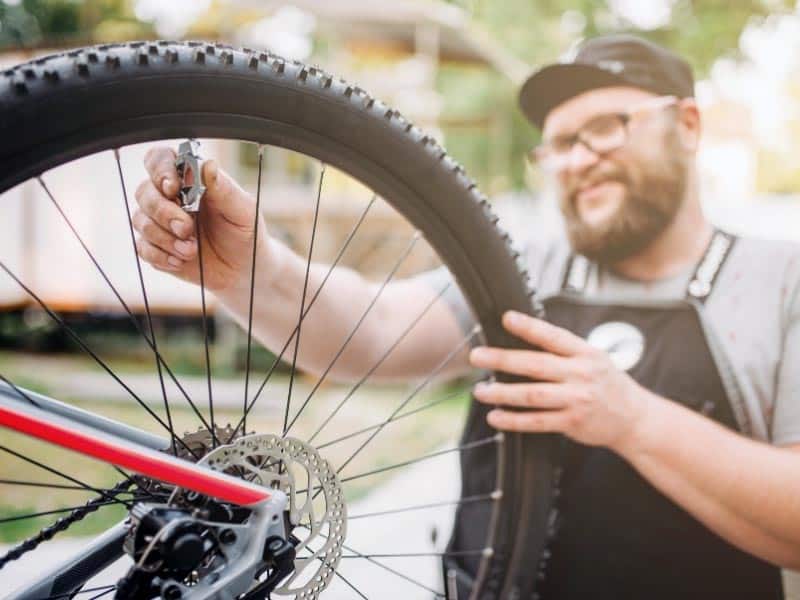Nothing is more frustrating than riding along on your bike, and suddenly a spoke breaks. Why do bicycle spokes break? Keep reading to find out.
There are a number of reasons that your bicycle spokes can break. The end result is usually frustration. Identifying the cause can go a long way in making sure you don’t break another spoke.
Factors such as weight, stress of riding, uneven tension and potholes can all cause a spoke to break. When you know these reasons, you can try to make sure you don’t break another one.
Sometimes you do not have any control over a bicycle spoke breaking. In most cases you can. I have compiled a list of the top reasons that bicycle spokes break so you know what to look out for and what to avoid.
Bicycle spokes can be expensive depending on the type you have, and it is a hassle to change them out. Plus, a damaged spoke can damage the wheel. Knowing why bicycle spokes break is a better way to keep things rolling.
Recommended Gear
To see all of my up-to-date recommendations for bikes and cycling gear, check out this resource that I made for you!
Table of Contents
Uneven Tension
Spoke tension is important because it keeps your wheels strong. Uneven tension can allow spokes to become loose and break or cause damage to the wheel.
It is important to test the spoke tension regularly to ensure your wheels last. Spokes with low tension will loosen each time the bike is ridden, and spokes that are too tight can split from the rim, so it is essential to check tension regularly.
You can check the spoke tension with wheel tension measuring kits, available at any bicycle or sporting goods store.
Spokes for bicycles should have tension between 62 Kfg (kilograms force) and 130 Kfg. You want to set the tension as high as the weakest segment of the bicycle, which will be the rim.
You will need to follow the tension standards set by the manufacturer, but the chart below can help identify the average spoke tensions for different wheels.
| Front Disc (Wheel) | Rear Drive (Wheel) | |
| Road Bikes | Between 80KFg – 110Kfg | 110Kfg |
| Mountain Bikes | Between 100KFg – 120Kfg | Between 100KFg – 120Kfg |
Stress of Riding Tough
Mountain bikes are designed to take on rugged terrain but riding too tough can still wear a bike down. Road bikes are even more susceptible to damage from tough riding.
Jumping curbs, performing tricks, wheelies, and even dropping the bike a lot all weaken the bike. In particular these hard activities can damage wheels and spokes.
Wheelies place additional pressure to the back wheels and rims. Jumping curbs and ramps can easily dent rims. If spokes are loose or weak in any way, they can break.
Having the right tension in your spokes will reduce the risk of breaking but riding really tough can still damage spokes that are properly maintained.
Mixing Different Kinds of Spokes
Spoke tension is crucial for proper wheel function. A properly balanced wheel will be stronger so broken spokes will be less likely.
Different spokes will have different gauges, and therefore different tensions. Buted spokes can be of the single or double variety and add strength.
These are good for heavier applications and tougher riding. You can also use bladed spokes to reduce wind resistance, so you have more speed.
Many people like to mix spokes so as to get the best of both worlds. This can lead to an unbalanced wheel. While you can mix different spokes on a wheel, it is not recommended.
Mixing buted and non-buted spokes is likely to cause breakage due to the difference in loads they can bear.
For continuity and better wheel control as well as stronger wheels, you should not mix spokes as this increases the chance of them breaking.
Hitting Potholes
Potholes are everywhere. In many cases you may see them in time and can avoid them. If not, they can do some damage to the wheel and spoke.
Specifically, potholes can dent the rims of the wheel. This can happen to mountain bikes too in spite of having more rugged wheels.
Denting the rim can cause a spoke to break. This is more likely if the spoke is worn down or already damaged in any way. Spokes that are too loose can also be knocked by a pothole and broken.
Maintaining the correct spoke tension will reduce the risk of damage from a pothole. Potholes are not good for the entire wheel, so they are better off avoided when possible.
Old and Damaged Wheel
As with all items, age can wear down integrity. Spokes are no different. An old bicycle wheel with old spokes will be weaker than brand new ones.
You can always check the spokes to make sure they are tight enough and so long as there are no cracks in the rim, they will work.
However, they may not stand up as well against potholes or being dropped on the ground. The same goes for cheaper wheels and spokes.
Tension is the most important aspect, but it will only do so much on a spoke made from cheap materials. Any wheel that has damage or missing spokes should not be used.
Cracks in the rim will increase the chance of a broken spoke and can damage other parts of the bicycle.
Having a new spoke will lead to more strength and better tension. Older spokes are more likely to come loose as you ride.
Overtightened Spokes
As mentioned, the tension of spokes is important to the overall integrity of the wheel. Too loose and they can break off but being too tight is just as problematic.
Overly tightened spokes can crack the rim as a result of too much force.
Having more spokes on the back wheel reduces the risk of cracked rims, but they need to be maintained at the right tension. A 36-spoke back wheel is ideal.
Use this guide and the manufacturers guide to determine the right tension for your bike spokes. Over time, tight spokes will damage the rim which will interfere with steering and control of the bicycle.
Too Much Weight
The thin nature of spokes makes you think as though any weight would cause them to buckle.
The tension created between the spokes and the rim is what gives them strength to hold up the bicycle and rider.
Too much weight can put unnecessary pressure on the spokes, but unless they are already damaged or loose, they should not break.
There are spokes designed to fit on wider rims and to support heavier weights, so repenting on the rider may be a better option to reduce risk of breakage.
The majority of bikes are designed to support up to 220 pounds. If you are significantly heavier than this, you may want to look at bicycles designed for heavier weights so as not to wear the bicycle down too quickly.
Type of Alloy Spoke Is Made From
Spokes can be made from different materials. Typically, an alloy of magnesium or aluminum is used. Alloys provide more strength than the original metals.
Cyclists like the sleek look of magnesium alloy spokes, because there are usually fewer of them used. As great as the look, this fewer number of spokes can lead to easier breakage.
With aluminum alloy spokes, you get lightweight spokes that are tough and durable. Magnesium alloy has great resistance to corrosion but at elevated temperature can begin to break down.
Over time, living in a hot climate can weaken your magnesium alloy spokes. Aluminum alloy spokes can withstand warm temperatures and are designed to handle colder weather better than other materials too.
The thin nature of the spokes does put them at risk for breaking over time and wear.
Using Child Seats
Having a child seat at the rear of the bicycle increases the weight on the back tire. This increases the forces placed on the rear spokes.
As mentioned, spokes are designed to hold up to 220 pounds, but this extra weight will wear down the spokes quicker.
It will be important to keep checking spoke tension if you have a child seat.
An improperly attached child seat can also contribute to a broken spoke. Uneven pressure to the tires can increase force to spokes on one side.
This can cause the rims to crack as spokes loosen under the pressure.,
Final Thoughts
A broken bicycle spoke is not the worst thing, but it can be an expensive repair and a hassle.
It is better to take preventative action and keep the tension of your spokes right at all times. There are several causes to the question “Why Do Bicycle Spokes Break”, and now you know them.
Spokes, along with other components of the bicycle will wear over time, but you can prevent them from breaking before their time is up.
I recommend watching out for these factors so you can take care of your spokes. With proper maintenance and forward thinking, spokes will be good, and your bicycle can ride you off into the sunset.


